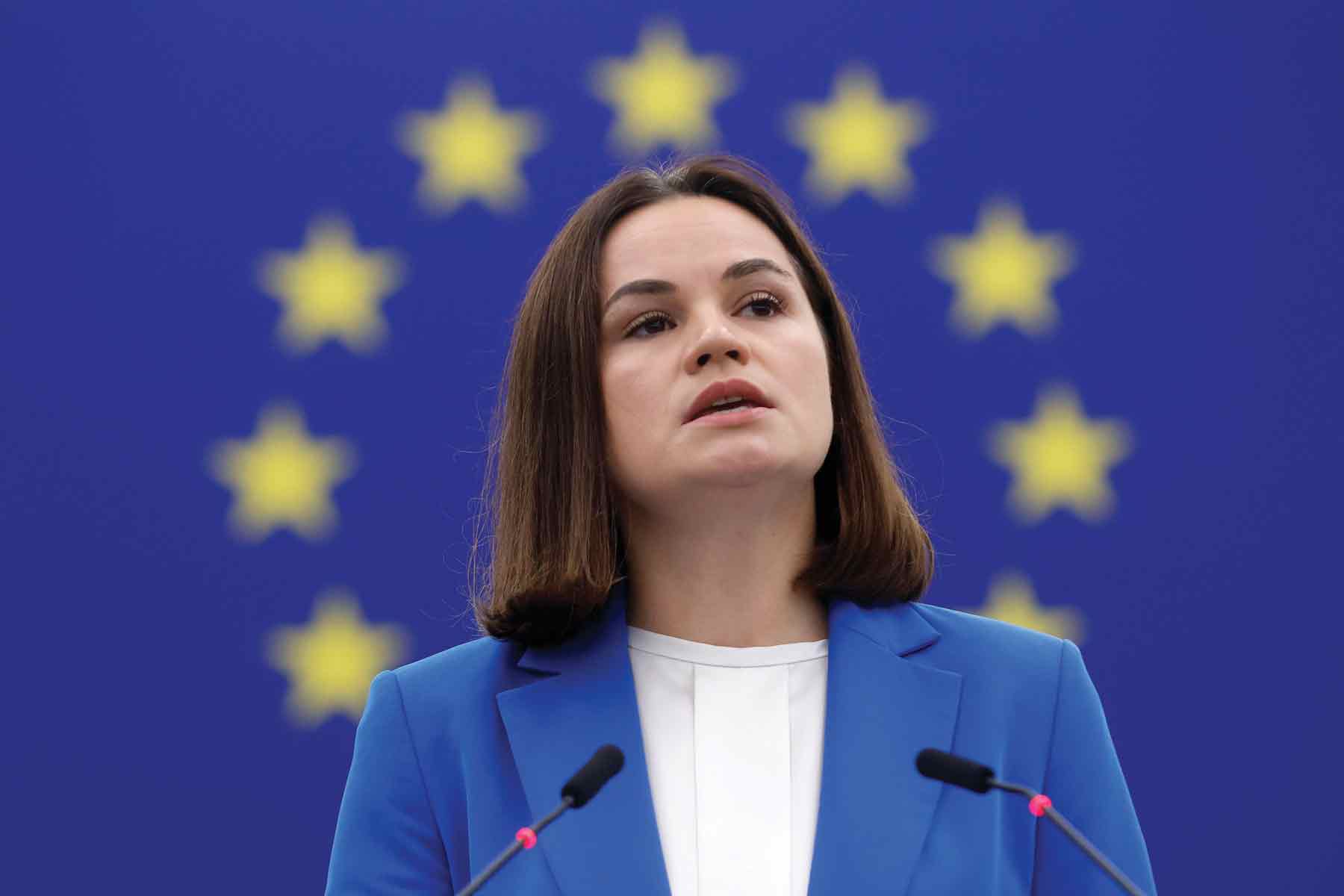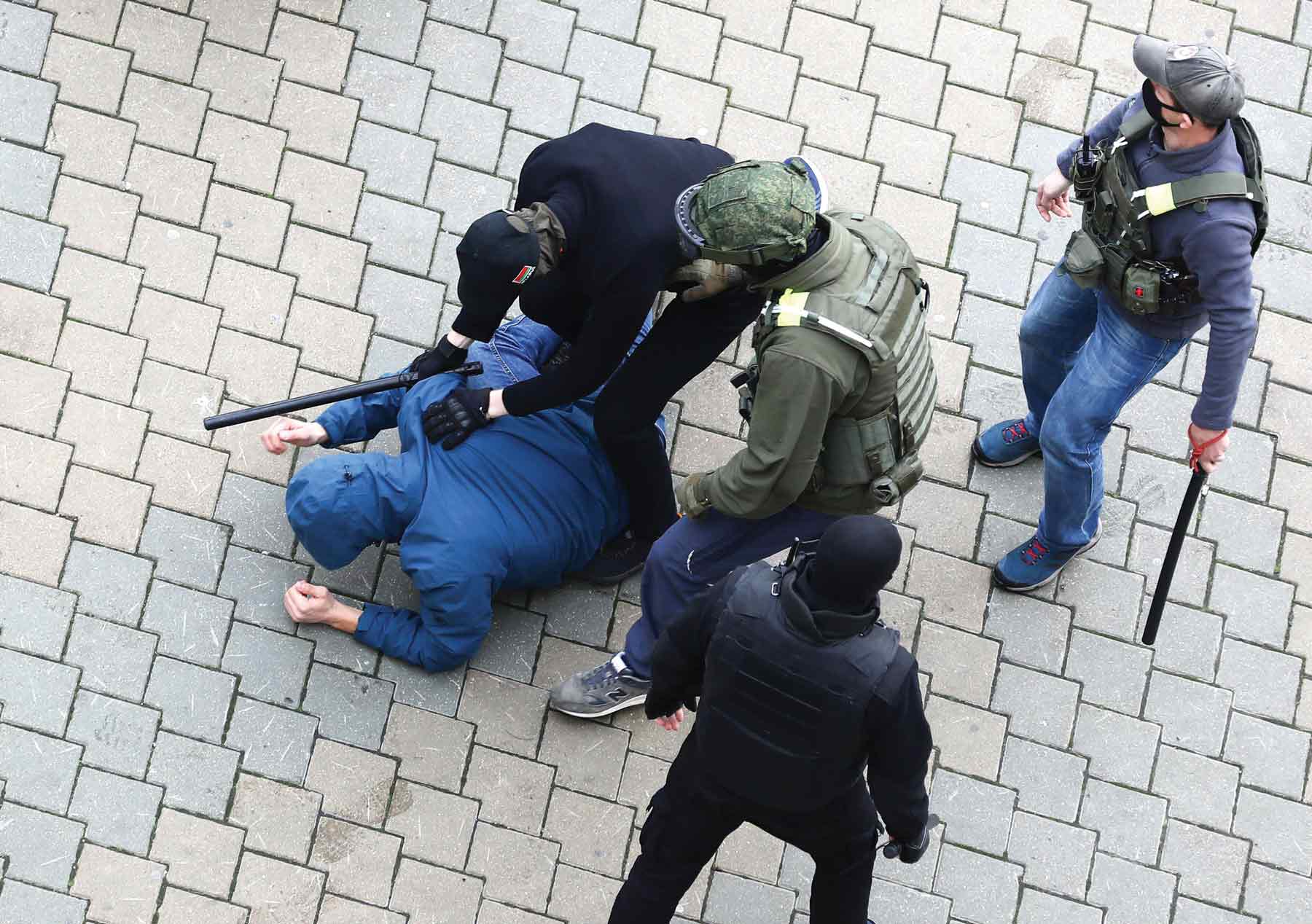Ales, whose name has been changed to protect his identity, did not resist when police showed up at his Minsk apartment to arrest him in August 2020. “They had weapons,” he tells The Parliament via a video call. “It would not have been reasonable to argue.”
Ales, a researcher who focuses on authoritarian regimes, can’t recall the charges on which he was locked up. “But I think it was just something about organising a protest,” he says.
He was one of the more than 33,000 Belarusians detained by Alexander Lukashenko’s regime over an eight-month period during the 2020 presidential election, according to figures from the Minsk-based human rights centre, Viasna. The European Union has refused to recognise the election outcome, which gave Lukashenko a landslide win, with officials criticising the elections as being “neither fair or free”.
According to independent news reports, Lukashenko received 34 per cent of the vote, with opposition candidate Sviatlana Tsikhanouskaya taking 56 per cent. After the results were announced, the mass protests, which had been taking place since May, intensified. The government tried to shut them down with brute force. At least four people reportedly lost their lives.
Tsikhanouskaya fled to Lithuania shortly after the election and now heads the United Transitional Cabinet of Belarus (UTC), an alternative government formed by the Coordination Council, a non-governmental body created to facilitate a democratic transfer of power. Between 100,000 and 200,000 people have left the country since August 2020, among them almost all the country’s journalists and political and civil society leaders.
 Exiled Belarusian opposition leader Sviatlana Tsikhanouskaya delivers a speech at the European Parliament on September 13, 2023 in Strasbourg.
Exiled Belarusian opposition leader Sviatlana Tsikhanouskaya delivers a speech at the European Parliament on September 13, 2023 in Strasbourg.
On 25 February, almost four years after the disputed election, Belarus, often described as Europe’s last dictatorship, is now set to hold parliamentary and local elections. A neighbour of Russia, Lithuania and Ukraine, Belarus has been ruled by Lukashenko since 1994, three years after declaring independence from the Soviet Union. No alternative candidates will participate in the elections, and Belarussian officials have said they will not allow observers from the Organisation for Security and Co-operation in Europe to monitor the elections.
“If a person has a gun to his head, it is difficult to expect the expression of free will from him. Belarusian society is in such a situation,” says Andrei Yahorau, speaker of the Coordination Council. “Democratic forces today call [us] to ignore the upcoming so-called elections, and if people are forced to go to vote, then [they should] vote against all candidates [on] the ballot.”
If a person has a gun to his head, it is difficult to expect the expression of free will from him.
According to Yahorau, the contested 2020 presidential elections signified a turning point for the Belarusian people. While there had been periods of political persecution before, usually coinciding with elections, there had also been periods of relative calm and what might be described as a more liberal atmosphere, he says.
“Before 2020, everyone understood that we had an authoritarian, non-democratic regime, but we also knew that we shouldn’t expect serious problems if we criticise the regime, even if we organise a protest,” adds Ales.
The researcher arrested in his Minsk apartment in 2020 does not expect people to head to the streets in February. “People didn’t care about the parliamentary elections before, and I don’t see any reason why they should care about them right now,” Ales says, describing Lukashenko as “a repressive authoritarian.” He adds: “Even saying online that you’re going to vote against everyone might put you in trouble in Belarus. Plus, there is no infrastructure of protest in Belarus compared to 2020.”
The repression in Belarus is reflected in its number of political prisoners. As of 7 February, the country had 1,422 political prisoners, up from a single political prisoner in 2019, according to the Viasna human rights group, most of whose staffers have relocated abroad for their own safety.
In September, Lukashenko also issued a decree that made it impossible for Belarusians living abroad to renew their passports overseas, forcing them to return to Belarus or live without valid documents abroad. “If they have something on you, any kind of evidence, then most likely you will be detained,” Ales says. In efforts to combat this, the Tsikhanouskaya-led government-in-exile has started issuing its own passports and is working on obtaining international recognition for those documents.
The country’s media landscape has also been impacted by the shift to a harsh, repressive political regime, with 28 journalists behind bars, according to Press Club Belarus, a Warsaw-based group of Belarusian media professionals. “Independent media are targeted specifically for providing fact-based reporting,” says Natalia Belikova, one of its members. “Right now, there is no true journalism and it’s mostly propaganda.”
And since Russia’s invasion of Ukraine two years ago, the Belarusian government’s alignment with Russian narratives has intensified – with, for instance, the West and Ukraine itself being blamed for the ongoing war.
 Police detain a man during an opposition rally to protest the official presidential election results in Minsk in November 2020
Police detain a man during an opposition rally to protest the official presidential election results in Minsk in November 2020
As a response to the Lukashenko regime’s repression and its involvement in hostilities against Ukraine, the EU has adopted seven packages of sanctions since October 2020, taking aim at the country’s political leaders and prominent media and judicial figures, including with travel bans and asset freezes.
The EU has also introduced restrictions on trade, banned five Belarusian banks from the Swift messaging system underpinning global financial transactions, and limited financial inflows from Belarus to the bloc.
Yahorau acknowledges that the sanctions have significantly limited the resources of Lukashenko’s regime, but says the flipside is that they “reduce the potential for social change.” He says the sanctions have pushed Belarus towards Russia, as Belarusian companies look for new trade routes and export markets.
The sanctions require more fine-tuning, Yahorau argues. But Peter Stano, the European Commission’s lead spokesperson for foreign affairs and security policy, counters: “Sanctions are targeted at those responsible, while reducing as much as possible any adverse humanitarian effects or unintended consequences for persons not targeted, in particular on the civilian population, or on neighbouring countries.” Appropriate derogations are in place for humanitarian purposes, he says.
For the Coordination Council’s Yahorau, the initiatives the EU has taken to support Belarusian democratic forces and civil society, as well as its decision to impose sanctions on Lukashenko’s regime, have been “extremely important.” But he says they won’t change the situation inside the country. “The EU, unfortunately, does not have a clear pro-active strategy for democratic change in Belarus,” Yahorau laments.
That’s an argument the Commission disputes. In an email to The Parliament, Stano insists the EU does have a clearly defined policy concerning Belarus. “The EU has reviewed its relations with Belarus and has taken decisive action to support democracy, human rights and fundamental freedoms through suspending bilateral co-operation with the authorities, recalibrating financial assistance, and increasing support to the Belarusian people and civil society,” he writes.
The EU has also committed almost €140m in support of the people of Belarus since August 2020. Additionally, the Commission has presented a comprehensive plan of economic support. Once Belarus transitions to a democracy, the EU has pledged to provide up to €3bn for the country in the form of grants and loans, leveraging public and private investments.
Stano notes that the Commission has also repeatedly called for the immediate and unconditional release of all political prisoners, and will continue to “work for justice for victims and accountability for perpetrators.”
As for the opposition’s plans to issue a ‘New Belarus’ passport, Stano explains that it’s up to individual EU countries to decide whether to recognise such documents. “Many Member States already provide documents to third-country nationals who cannot receive documents from their countries of origin,” he adds.
It’s the country that’s most prepared to become a European Union member.
Ales believes EU institutions can’t do anything to change the situation within Belarus. But individual EU countries could help by relaxing their immigration and asylum rules, thereby helping the thousands of Belarusians exiled across the Union to build a new life, at least for as long as Lukashenko stays in power.
Nearly four years have passed since Ales’ detention. He was released after three days, but others remain in prison – including Syarhei Tsikhanouski, husband of exiled opposition leader Tsikhanouskaya. Still, Ales is convinced that Belarus’ regime will eventually crumble, allowing the nation to transition to democracy.
“It’s just a question of time,” he says, emphasising the country’s low levels of institutional corruption, its high education levels, and citizens’ strong work ethic. “It’s the country that’s most prepared to become a European Union member.”
Sign up to The Parliament's weekly newsletter
Every Friday our editorial team goes behind the headlines to offer insight and analysis on the key stories driving the EU agenda. Subscribe for free here.